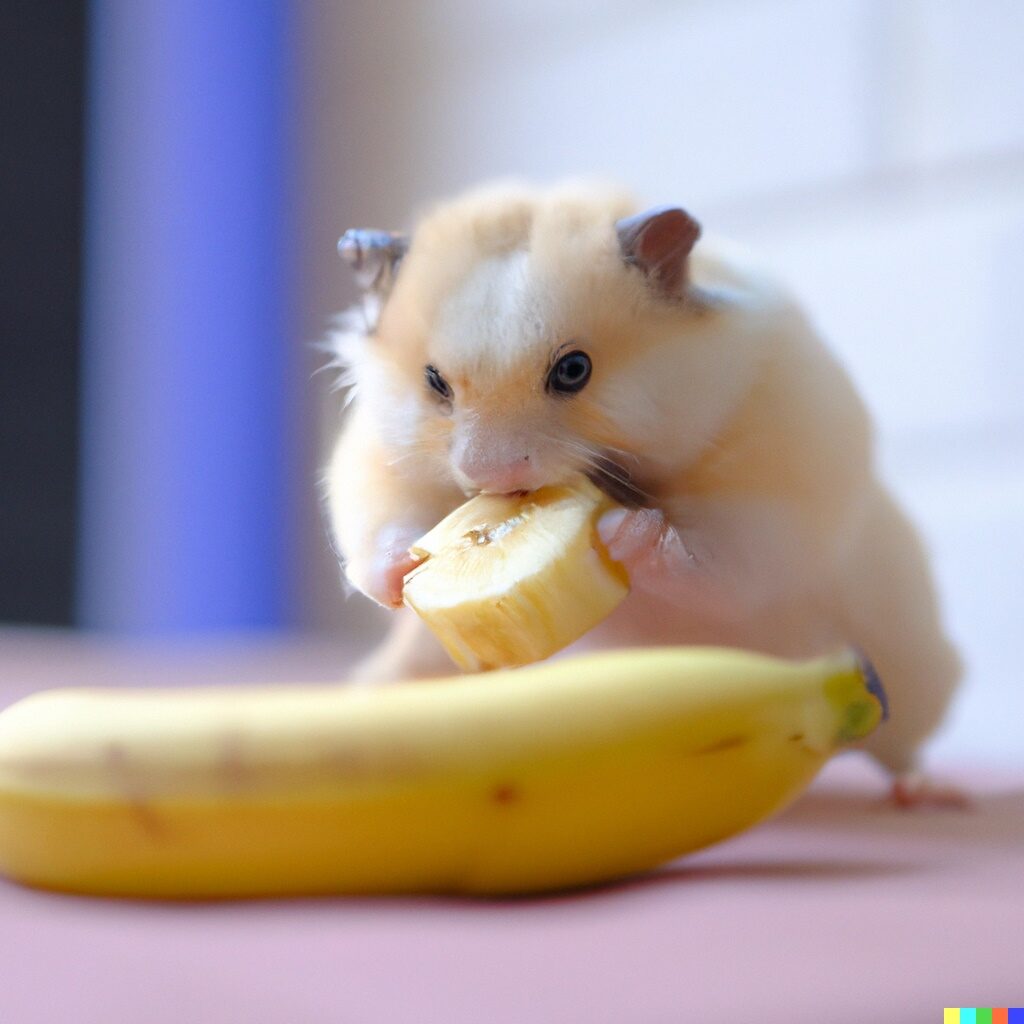Yes, hamsters can eat bananas. When feeding bananas to hamsters, it is important to consider their safety. Do you have a pet hamster? Have you ever wondered if it’s safe for your furry friend to eat bananas? If so, then you’ve come to the right place! In this article, we’ll explore whether or not it’s okay for hamsters to enjoy the sweet taste of bananas. We’ll also cover some tips on how to feed your little buddy this tasty treat!
Safety Considerations for Feeding Bananas to Hamsters
Bananas are a healthy snack for many animals and can provide essential minerals and vitamins, but there are some precautions that should be taken when offering them as food.
Consumption: The first consideration is the amount of banana consumed by your pet. Too much banana can lead to obesity or other health problems since it contains a lot of sugar and calories. To avoid your hamster eating too much in one sitting, offer small amounts at a time. Additionally, you should avoid giving them any parts of the peel or stem, as these can cause choking or intestinal blockages if ingested.
Preparation: When preparing bananas for consumption by your pet, make sure they are washed thoroughly before being cut into slices or cubes so that all dirt and bacteria are removed from the surface. Additionally, make sure they are ripe enough; unripe fruit may contain toxins that could cause gastrointestinal distress in your hamster if eaten in large quantities. Once ready for consumption, cut into small pieces so there’s no risk of choking on larger chunks while eating! Finally, always avoid adding any extra ingredients, such as sweeteners or spices, which could be potentially harmful to pets if ingested in large doses over time.
Also read: Can hamsters eat tomatoes?
Nutritional Benefits of Bananas for Hamsters
Bananas are an excellent source of nutrition for hamsters. They are full of important vitamins and minerals and help these small rodents in many ways. In addition to their nutritional value, bananas also make a great snack that will keep your pet entertained and happy.
Bananas are a good source of fiber, magnesium, potassium, copper, and vitamins C and B6. Vitamin C is important for healthy bone and tooth growth in hamsters, while B6 helps with nerve cell development. Magnesium helps control how much sugar is in your blood, and potassium helps you digest food. Both are important for your overall health. Copper helps muscles work, which makes your furry friend more active, and dietary fiber keeps their digestive system running smoothly by making waste easier to get rid of.
In terms of other nutrients found in bananas, such as carbohydrates, fat, and protein, these should be supplemented by other foods like hay or fortified pellets, but a few slices from time to time can be beneficial too! They not only provide essential micronutrients for optimal health, but they also make delicious treats that provide mental stimulation through smell or taste exploration as well as physical exercise if fed whole pieces (rather than chopped-up bits). Bananas also have calming effects, so giving this tasty fruit to your hamster may help them a lot.
You may also read: Can hamsters be trained?
Types of Bananas Safe for Hamsters
Hamsters are picky eaters, and it’s important to know what kinds of food they can safely consume. Bananas are a popular snack option for humans, but you may be wondering if these fruits are also safe for hamsters. The answer is yes, as long as the bananas you offer your pet meet certain criteria.
- Ripe Bananas: It’s best to avoid giving your hamster unripe or green bananas. These contain too much starch, which makes it difficult for them to digest properly. Instead look for ripe or yellow-brown bananas that have no visible bruises.
- Frozen Bananas: Another great option is frozen banana slices – just make sure they’ve thawed completely first so that your hamster won’t risk choking on any hard pieces! You can mix them in with other treats like nuts, seeds, and grains to give your pet a special treat.
Organic Options: Whenever possible, try to choose organic varieties of banana when feeding your hamster. This will help ensure that the fruit hasn’t been treated with pesticides or herbicides, which could be harmful if consumed by a small rodent like a hamster.
Banana skins shouldn’t be given out either, because their tough texture and parts like enzymes and tannins that aren’t digestible can cause intestinal blockages. If you want to give your pet something extra tasty, then consider offering cooked plantains instead, which provide similar health benefits but without the risks associated with banana skins!
How to Prepare and Serve Bananas to Your Pet
Bananas are a healthy, affordable snack for your pet. Not only do they provide essential vitamins and minerals, but they also taste great!
When serving bananas to your pet, it’s important to consider their size and the texture of the fruit. Depending on the type of animal you have, younger or smaller pets may not be able to handle large chunks safely. It’s best to mash up or puree the banana before feeding it in order to make sure there are no choking hazards present. If you don’t want to take the time to prepare food for them yourself, look for commercially prepared snacks that contain mashed banana as an ingredient.
In addition to preparing the banana properly, you should also think about how often you feed it. Bananas can be given as a special treat here and there (no more than once per day), but if used too frequently, they can cause digestive problems due to their high sugar content. You should always consult with your veterinarian before introducing new foods into your pet’s diet so that they can advise on what is appropriate depending on the breed and size of the animal.
- Mash up or puree ripe bananas
- Look for pre-prepared treats containing mashed banana
- Consult with vet before introducing new foods
Monitoring Your Pet’s Health after Eating Banana
Peels
Maintaining Health
It is important that pet owners remain aware of their pets’ health after they have consumed banana peels. The owners should keep an eye out for changes in behavior and body language, as these can be signs of a reaction to the food. It is also important to make sure that your pet has plenty of fresh water available at all times, as this helps keep them hydrated and prevents dehydration from occurring. Also, it’s important to pay close attention to how much energy your pet has during the day. If it seems to have too much energy, it could be a sign of a deeper problem that needs to be looked into.
Monitoring Habits
Veterinarians recommend that pet owners take their pets in for regular checkups to make sure that their pets’ diets are balanced and healthy. This includes seeing if there are any signs or symptoms, like throwing up or having diarrhea after eating banana peels, that something is wrong with your stomach. If you suspect something may not be right, it is always best practice to seek medical advice so that the underlying cause can be identified and addressed appropriately. Finally, ensure you give your pets lots of exercise and play time; this will help strengthen muscles while promoting overall fitness levels!
FAQS
How much banana can I give my hamster?
Bananas can be a healthy treat for your hamster, but they should only be given in very small amounts. A good rule of thumb is to give no more than one teaspoon of mashed banana per day, as too much can cause digestive upset or even obesity. It’s important to take it slow and introduce the fruit into their diet gradually by mixing it with other foods like vegetables or high-protein pellets.
Is banana poisonous to hamsters?
No, bananas are not poisonous to hamsters. Bananas are a healthy treat for hamsters and many other small animals, providing them with essential vitamins and minerals. However, moderation is key when feeding your pet bananas, as too much can lead to health issues such as obesity or digestive problems.
What not to do with hamsters?
Hamsters are lovable, furry creatures that make great pets. However, they need to be cared for properly in order to stay healthy and happy. It’s important not to overfeed them, handle them too roughly, or keep them in a cage with wire bars, as this can cause injury. Do not take your hamster outside unless you have the proper enclosure and it’s safe from predators. Do not let other animals near your hamster since he may become stressed or even attacked. Also, avoid exposing him to loud noises or bright lights as this could frighten him.
What should hamsters avoid?
Hamsters should avoid anything that might be hazardous to their health or safety, such as sugary foods, caffeine, and alcohol. They should also stay away from any small objects they could easily swallow or choke on and sharp items that could cause injury. It’s important for hamsters to have a safe environment where they can explore without the risk of getting hurt.
Do hamsters hear you?
Hamsters have the ability to hear, but they may not always be paying attention. They are more likely to respond to loud or sudden noises, like clapping your hands or calling their name. As with any creature, each hamster is different, and some may be more receptive than others. Hamsters can also pick up on vibrations in the ground that might indicate danger coming from a predator, so they may become aware of your presence even if they don’t seem to be paying attention.















